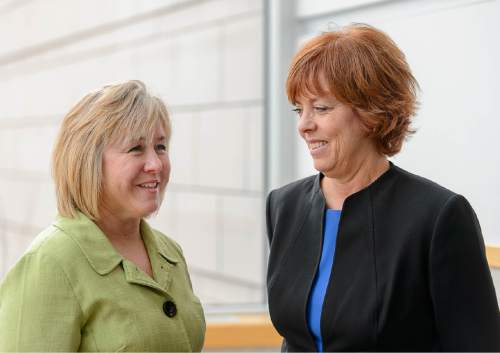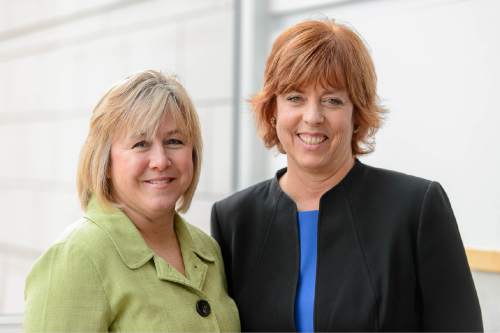This is an archived article that was published on sltrib.com in 2015, and information in the article may be outdated. It is provided only for personal research purposes and may not be reprinted.
It took a while to find a ride for the girl who drank too much.
After half a bottle of Captain Morgan and a dozen shots of vodka in just a few hours, the 17-year-old passed out in the white Toyota 4Runner of a guy she'd never met.
Her friend in Preston, Idaho, asked him to retrieve the stranded teen and chauffeur her the nearly 30 miles back home from Logan, court documents show.
Prosecutors months later in a Logan courtroom argued the 19-year-old driver pulled over by the side of the road in Smithfield on Dec. 8, 2007, and raped the unconscious girl sometime before midnight.
His attorneys countered that she had at some point initiated sex, grabbing at his hand and lap.
"Do you know if you ever pushed him away?," a defense attorney asked in a preliminary hearing.
"I don't remember," the teen said.
In 2008, a district court judge tossed the case before trial, citing Utah law, which stipulates that impairment is not proof enough of rape; evidence must show the alleged victim also expressed non-consent.
Prosecutors say the 8-year-old Logan rape case is one of several over the years that have been undermined by a loophole in the state's consent law that requires them to prove both incapacitation and a definitive lack of consent. Some cases have been quashed. In others, charges never were filed because of the apparent conflict in the law.
Utah lawmakers aim to fix that legal conundrum with a bill that, after an initial hiccup in a committee, sailed through both the Utah House and Senate with no debate. HB74 awaits final approval from the governor.
"It's a long time coming," said bill sponsor Rep. Angela Romero, in a recent interview with The Tribune.
The Salt Lake City Democrat says being asleep, passed out or otherwise unconscious is just as good as saying "no."
In the Logan case, the accused attacker's attorneys were able to probe the alleged victim's incapacitation to make their defense.
"You don't know if you agreed to have sex...do you?" defense attorney Tara Isaacson asked the teen in that 2008 hearing.
"No," she replied.
In the end, the judge agreed with Isaacson, who argued "I don't remember" doesn't mean "I didn't consent."
Clearing up the difference in state law could change the outcome of cases like the one in Logan, said deputy Cache County attorney Barb Lachmar.
"The law needs to put the responsibility on the person who is awake, alert and able to asses that if there's an unconscious person and you go ahead and have sex with them, that's gonna be a problem," she said.
"It's clear to me that he raped her," Lachmar added, "but we weren't even able to have the jury look at the case."
The Salt Lake Tribune will not name either the alleged victim or the accused attacker in this case.
Wally Bugden maintains his client's innocence.
"Our client said it was consensual behavior," Bugden said Friday. "He said that she was talking, walking and gave the appearance of consent."
The clean-up in code could have brought the case to trial, he said, but would not necessarily lead to a conviction. The jury would still consider whether she was too drunk or otherwise unable to consent.
Donna Kelly, resource prosecutor at the Utah Prosecution Council, argues the proposed change to state law would simply nix superfluous language.
"How can a victim express lack of consent if they're unconscious?" she said.
It's unclear how many more sex assault cases could lead to trials or eventual convictions if Gov. Gary Herbert signs off on the change. Rapes go largely unreported and few result in charges.
Still, a small but significant group of survivors stands to benefit, said Alana Kindness, director of the Utah Coalition Against Sexual Assault, referencing a Salt Lake County study that found about 15 percent of hospital rape exams involve a patient who reports having been awoken by sexual assault.
At the Legislature, some debated if the change is necessary.
Rep. LaVar Christensen, R-Draper, questioned in a House committee whether the proposed statute was "so vague and so open" that it would favor accusers. Christensen declined additional comment Friday at the Capitol, but noted in an email he has voted for the bill.
Other lawmakers on the House Judiciary Committee hesitated to give early approval, wondering aloud if marriage or long-standing romantic ties between a couple could nullify any allegations of rape.
But Kelly said it's simple: "Consent is never implied."
Utah is not the only state with a conflicted consent law. Texas has a similar statute, though no one there appears to be are advocating for a change. But "that doesn't mean that it's not important," said Rose Luna, the communications director for the Texas Association Against Sexual Assault.
Among sex assault cases that are reported to police, Luna said, "I would hate it for the few that actually do make it to that step, that there's this law that would go against them."
In recent years, several states have bolstered protections for sex assault victims who allege they were unconscious at the time, including Arizona, Florida, Maryland, Minnesota and New Jersey.
In Cache County, the case was dismissed "with prejudice," meaning that it is effectively closed.
Twitter: @anniebknox





